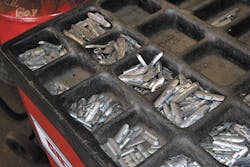In 2009, it looked like lead wheel weights were destined to become a tire shop memory. In August of that year, the U.S. Environmental Protection Agency (EPA) said it would pursue a nationwide ban on the manufacture and distribution of lead wheel weights. Yet in 2017, lead wheel weights remain legal in 42 states.
In the absence of federal regulation, eight states have chosen to enact laws prohibiting lead wheel weights to address environmental concerns.
Washington was the first in 2011. The latest is Maryland, which passed a lead wheel weight law in May 2017. The other states with bans are California, Illinois, Maine, Vermont, Minnesota and New York.
The eight states that have banned lead wheel weights represent almost a third of the wheel weight market, according to Gregory Parker, marketing director for Wegmann automotive USA Inc.
“Maryland represents a very small percentage of the overall market, but based on registered vehicle count, the eight states make up 30% of the U.S. market,” says Parker.
Don Vanderheyden, director of marketing for Hennessy Industries Inc., says although lead has become a lower priority for the EPA, the market will eventually adopt non-lead wheel weights.
“Lead has been taken out of about everything,” he said, citing paint, gasoline, and fishing weights as examples. “We believe that with training and understanding, the market will continue to move to non-lead alternatives.”
National retailers are using non-lead options
To avoid having to stock lead and non-lead alternatives, national retailers have switched most of their inventory to non-lead wheel weights.
“Most national retailers want a non-lead solution. They don’t want to mix between the lead and non-lead offering, they just want to have one style of wheel weights,” says Vanderheyden.
But lead wheel weights are often used by local and regional tire retailers. “It’s good material for a wheel weight, and it’s easy for a technician to work with,” says Vanderheyden.
Of the three materials used for wheel weights, lead is more malleable and denser than steel and zinc.
“Lead gives theoretically the best balance overall because it’s a dense material,” says Vanderheyden. “You give up some density when you move to a steel or zinc weight. That means the weight could be bigger.”
Hennessy’s Bada brand offers steel and lead clip-style weights and adhesive weights. “When we deal with national retailers we have to have a wide range of steel offerings. We also have a lot of traditional distribution across the greater U.S. that’s still using lead, so we’re very much split between the two materials,” says Vanderheyden.
Raw material prices for lead, zinc and steel have gone up in the last year, with lead experiencing the most dramatic increases. The price of lead went up about 9% at the beginning of the second quarter of 2017 and roughly 11% in the third quarter, according to Vanderheyden.
The market has many lead alternatives readily available, according to Parker.
“Manufacturers, like Wegmann, are continually preparing themselves with additional non-lead capacity if lead were to be banned nationally.”
Parker says wheel weight innovations include cold weather and acrylic-based adhesive tapes from Perfect Equipment that give the market options that best fit their local climate and Multi-Fit universal wheel weights that help shops reduce inventory.
In addition, premium weights from Hofmann Power Weight are used by OEs like Chrysler, Ford, BMW and Nissan in their U.S. manufacturing plants, according to Parker.
Programs to recycle used wheel weights
Hennessy and Wegmann offer recycling programs for their customers. Both manufacturers accept zinc, steel and lead weights, and shops do not need to sort their used wheel weights to participate in their programs.
Parker says the wheel weight recycling stream of the past that was 100% lead has gone away as now the stream is mixed between lead, zinc and steel.
“All three materials are 100% recyclable and many recyclers are happy to take those materials and process them. The key is finding the right partner that provides your business with the service and documentation you need to be environmentally responsible,” says Parker. ■
See also:
The Latestst Update on Wheel Weights
Test the Alternatives as Wheel Weight Markets Shift Away From Lead
About the Author

Ann Neal
Ann Neal is a former senior editor at Modern Tire Dealer.
